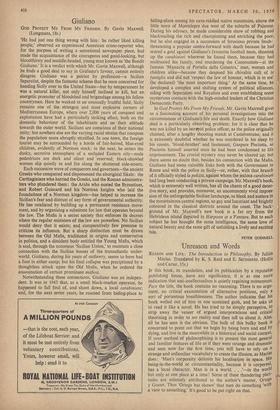Giuliano
GOD PROTECT ME FROM MY FRIENDS. By Gavin Maxwell. (Longmans, 18s.)
`HE had just one thing wrong with him: he rather liked killing people,' observed an experienced American crime-reporter who, for the purpose of writing a sensational newspaper piece, had made the acquaintance of the courageous and good-looking, but bloodthirsty and muddle-headed, young man known as `the Bandit Giuliano.' It is a verdict with which Mr. Gavin Maxwell, although he finds a good deal to say in Giuliano's favour, cannot entirely disagree. Giuliano was a patriot by profession—a Sicilian Separatist, despite the fantastic scheme that he once conceived for handing Sicily over to the United States—but by temperament he was a natural killer, not only himself inclined to kill, but an energetic promoter of bloodshed and brigandage among his fellow countrymen. Here he worked in an unusually fruitful field; Sicily remains one of the strangest and most explosive corners of Mediterranean Europe, where over 2,000 years of conquest and exploitation have had a particularly striking effect, both on the domestic behaviour of the inhabitants and on their attitude towards the outer world. Sicilians are conscious of their national amity; but nowhere else are the varying racial strains that compose the population more abruptly stratified. In one town, the foreign tourist may be surrounded by a horde of fair-haired, blue-eyed children, evidently of Norman stock; in the next, he enters the dusky, secretive atmosphere of a secluded Eastern city—male pedestrians are dark and silent and reserved; black-shawled women slip quietly to and fro along the shuttered side-streets.
Each successive wave of conquerors and governors—the ancient Greeks who conquered and dispossessed the aboriginal Sikels : the Carthaginians who harried the Greeks, and the Roman administra- tors who plundered them: the Arabs who ousted the Byzantines, and Robert Guiscard and his Norman knights who laid the foundations of a Norman kingdom—has helped to increase the Sicilian's fear and distrust of any form of governmental authority. He has retaliated by building up a permanent resistance move- ment, and by organising a substitute for law that operates beyond the law. The Mafia is a secret society that enforces its decrees where the regular ministers of the law are powerless. No Sicilian would deny that it exists; and comparatively few presume to criticise its influence. But a sharp distinction must be drawn between the Oid Mafia, traditional in origins and conservative in politics, and a dissident body entitled the Young Mafia, which is said, through the notorious 'Sicilian Union,' to maintain a close connection with the Sicilian bosses of the transatlantic under- world. Giuliano, during his years of outlawry, seems to have had a foot in either camp; but his final collapse was precipitated by a thoughtless attack upon the Old Mafia, when he ordered the assassination of certain prominent mafiosi.
Notwithstanding these connections, Giuliano was an indepen- dent. It was in 1943 that, as a small black-market operator, he happened to fall foul of, and shoot down, a local carabiniere; and, for the next seven years, he roamed from hiding-place to hiding-place among his cave-riddled native mountains, above the little town of Montelepre due west of the suburbs of Palermo. During his odyssey, he made considerable show of robbing and blackmailing the rich and championing and enriching the poor, but he also engaged in a succession of ferocious private feuds: threatening a popular centre-forward with death because he had scored a goal against Giuliano's favourite football team, shooting up the carabinieri wherever he found them, because they had maltreated his family, and murdering the Communists—at the famous 'Massacre of Portella della Ginestra,' men, women and children alike—because they despised his chivalric cult of /a famiglia and did not 'respect the law of honour, which is to me' (he declared) `the most important thing.' At the same time, he developed a complex and shifting system of political alliances, siding with Separatists and Royalists and even establishing some mysterious contacts with the high-minded leaders of the Christian Democratic Party.
In God Protect Me From My Friends, Mr. Gavin Maxwell gives us a fascinating account of his personal investigations into the circumstances of Giuliano's life and death. Exactly how Giuliano died is a particularly absorbing problem; for it is clear that he was not killed by an intrepid police officer, as the police originally claimed, after a lengthy shooting match at Castelvetrano; and it is extremely doubtful whether he was murdered in his sleep by his cousin, 'blood-brother' and lieutenant, Gaspare Pisciotta, as Pisciotta himself asserted once he had been condemned to life imprisonment. The crucial mystery may never be cleared up; but there seems no doubt that, besides his connection with the Mafia, Giuliano had some valuable links both with the Government in Rome and with the police in Sicily—or, rather, with that branch of it officially styled la polizia, against whom the jealous carabinieri had long been conducting a private campaign. Mr. Maxwell's book, which is extremely well written, has all the charm of a good detec- tive story, and provides, moreover, an uncommonly vivid impres- sion of the unforgettable Sicilian landscape, so bleak and austere in the mountainous central regions, so gay and luxuriant and brightly coloured in the classical districts around the coast. The back- ground of Mr. Maxwell's new book is a far cry from the Hebridean island depicted in Harpoon at a Venture. But to each subject he has brought the same intelligence, the same love of natural beauty and the same gift of unfolding a lively and exciting tale.
PETER QUENNELL


































 Previous page
Previous page